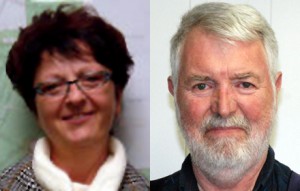Two seek Clintonville council seat
By Bert Lehman

Alderwoman Gloria Dunlavy will be challenged by Chuck Manske in the Tuesday, April 5 election for a seat on the Clintonville City Council representing District 2.
To help inform voters where the candidates stand on the issues concerning Clintonville, the Tribune-Gazette asked the candidates several questions. The questions and their responses are listed below.
What qualifications do you have that would help you when serving on the council?
Dunlavy: I have served on the council for over 10 years, and chaired many different committees during that time.
Manske: In my 35 years here in Clintonville, I have been on many committees and boards to serve this community and my church. As a teacher, I learned that each person has gifts and talents, and they want to share them to make things better. I listen. I ask questions. I respect others, and live by the Golden Rule.
What are the two most important issues facing the city of Clintonville?
Dunlavy: We have many issues in Clintonville that need to be addressed.
1. Angelus – The possibility of Angelus becoming a non-profit and losing this money from our tax base. The council was unaware of this until our City Administrator Chuck Kell found this information. This was in a TIF district. Non-profit is no taxes paid. The TIF will not be paid back to the city.
2. The dam – This should have been addressed in 2012. It was not. We may not get any grants through the DNR as it was previously ignored.
3. Flooding in the industrial park – The list goes on. We presently have a city administration who actively pursues grants. Thank you Chuck Kell.
Manske: First, we have to figure out where we are going to get enough money to do all the projects we want to do, and at the same time become more self-sufficient.
Second, we must rebuild relationships of respect and trust among members of the council, city staff, and the citizens we serve.
If elected, what would you do to find solutions to those issues?
Dunlavy: Solutions to the above problems are being addressed. We have a great city administrator in Chuck Kell. He is looking for ways to fund these issues without breaking the taxpayers’ backs through available grants.
Manske: Invite citizens more often to tell us what would make Clintonville a better place for them to live, and how we can work together to make it happen.
Ask citizens what projects are most important to them, so we can focus our money on those items.
Keep the people informed about the decisions made by the council, and how they affect individuals and the community.
Develop a local volunteer system which finds ways people can use their skills and talents to build a better community.
The city of Clintonville has used undesignated fund balance funds to balance the last two budgets, what does the city have to do in order to stop tapping into this fund?
Dunlavy: We would not have had to use the undesignated fund balance if we would have stayed within the tax ceiling set by the state. Because of this we lost the state monies.
Our department heads did a commendable job in trying to cut spending. We also dipped into the fund due to the unfunded pension liability that had not been kept up to date for many years. We were not even paying interest.
Manske: First, make sure the budget reflects the needs of the whole community.
Second, look at the big picture of what it is we desire for Clintonville in three, five, or 10 years.
Then, figure out how to raise enough money, through taxes or fees or other revenue, to pay for what we need and want. Are you willing to pay a little more in taxes to make these things happen? If not all of us, who else would pay?
Then the undesignated fund balance can be used for “unexpected” purposes, or, if some is left at the end of the year, for a “bonus” project.
The city of Clintonville spent more than $100,000 on the investigation of and settlement with former city administrator Lisa Kotter, but no official report was released to the public. In an effort to promote open government, should a report of the findings of the investigation be released to the public? If yes, why should it be released? If no, why should it not be released?
Dunlavy: The mayor stopped the investigation, therefore it was never finalized. There is no report to release.
Manske: Yes, the citizens deserve to know how and why this money was spent. The report doesn’t have to be long. Just a list of related expenses with brief explanations of each.
The city’s outdoor swimming pool has been an item of discussion for more than a year, but no solutions have been presented. What process does the city need to follow in order to make a decision about what to do with the outdoor swimming pool?
Dunlavy: Yes or no referendum. Taxpayers given the opportunity to decide, but realize it comes with a cost.
Manske: Gather citizens to discuss “What do we need?”, “What will we actually use?” and where will parents sit while they are being responsible for their children’s actions? Who will lead this effort?
Come up with a plan for the facility. Suggest possible sources of funding. Bring the package to the City Council for support and assistance.
